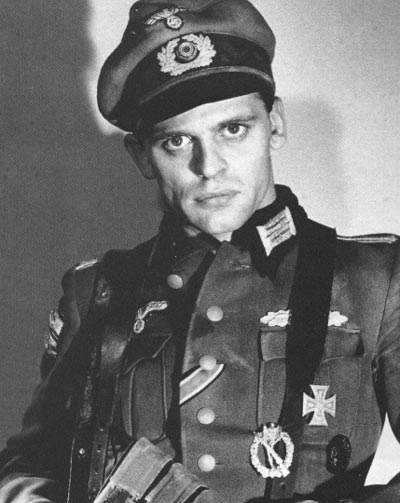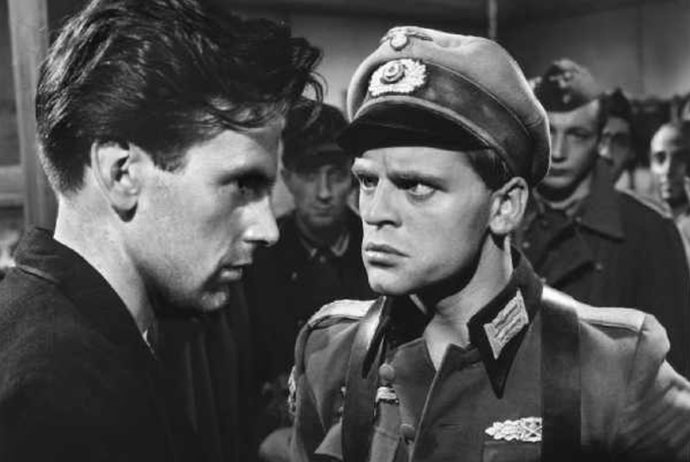Dir: László Benedek
Star: Hilde Krahl, Bernhard Wicki, Ursula Herking, Klaus Kinski
By coincidence this was watched not long after Decision Before Dawn, with which it shares some similarities in setting – both take place in Germany, during the last days of World War II. But they approach the topic from radically different angles, as they inevitably must, as a result of their very distinct origins. DBD was a story told from the Allied viewpoint, even if it had a German (working as a spy) at its main character. Kinder is from the perspective of those being invaded, and though neither film soft-pedals the devastation inflicted on the country, this is certainly the more downbeat entry.
A varied group of six women are thrown together by a common concern. Their teenage sons (and, in one case, brother) have absconded from their school in Stettin (now part of Poland, and called Szczecin), running off to join the battle against the encroaching Soviet forces. The women decide to head to the front and retrieve their children, taking them to safety by whatever means is necessary. It’s a journey fraught with danger, and when they reach the battle-zone, discover that getting their sons back is not going to be as easy as you might expect. They encounter resistance from both the commanding officers, who need every pair of hands they can find, and also the young recruits.
Kinski’s role in this is small, but fairly significant, in terms of establishing the downbeat, almost fatalistic atmosphere. On their route, the women take shelter in an abandoned inn for the night, only to be startled by the arrival of a platoon of soldiers, under the command of their Lieutenant (Kinski). He’s struggling to keep them in check, as he explains to the women:
“They’re stragglers, you see? They were collected from front command centers, and off the street. They gave them to me and said, “Take them to the front for a while.” Of course they don’t want to. They’ve had enough. They lay on the side of the road for a while and I don’t know what they thought about. Maybe about home, or something like you. But it’s of no use to them. They all have to go back. And perish.”
Because of this, to keep the group together, he has to enforce absolute discipline. The next morning, one of his soldiers refuses to go on, and to the horror of the women, is taken outside by the Lieutenant and shot as a deserter. Coincidentally, the victim is played by another future German star, early in his career: making his movie debut was Maximilian Schell, who would go on to win a Best Actor Oscar in the sixties, for his performance Judgment at Nuremburg. This was the only film in which they would work together.
This incident largely sets the bleak tone of the movie. [Skip this and the next paragraph is you want to avoid spoilers] At the front, one of the women, the widowed Helene Asmussen (Krahl), forms a relationship with Hauptmann Dornberg (Wicki), commander of the battalion where her son has been sent. [Wicki was also in Paris, Texas, where he played Doctor Ulmer, the man who rescues Harry Dean Stanton after he wanders out of the desert. Four years later, he’d direct the not dissimilar Die Brücke, also about teenage boys who volunteer in the last days of the conflict] She eventually succeeds in persuading him to disobey orders and save his men from inevitable death, by abandoning the battalion’s hopeless position to retreat instead, and letting the surviving boys go.
 But just as they’re about to depart, the Russian stage an attack, and all men in uniform are recalled into action. The film ends with the mothers watching as their sons, once again, head off to face the enemy. “God in heaven, they’re really going back,” says the female pastor who has been part of the group. “Leave God out of it,” replies another mother. “It’s man’s doing. It’s always man’s doing…” The End. There is an alternative finale, which had me expecting a less downbeat version in which the families are re-united and escape from the front. Nope. It’s basically the same, only with slightly different final dialogue: instead of offering commentary about God and man, it’s a simple, “They’ve forgotten us. They will always forget us.” The End.
But just as they’re about to depart, the Russian stage an attack, and all men in uniform are recalled into action. The film ends with the mothers watching as their sons, once again, head off to face the enemy. “God in heaven, they’re really going back,” says the female pastor who has been part of the group. “Leave God out of it,” replies another mother. “It’s man’s doing. It’s always man’s doing…” The End. There is an alternative finale, which had me expecting a less downbeat version in which the families are re-united and escape from the front. Nope. It’s basically the same, only with slightly different final dialogue: instead of offering commentary about God and man, it’s a simple, “They’ve forgotten us. They will always forget us.” The End.
The screenplay was based on a book, Hauen Sie ab mit Heldentum, written by German author Herbert Reinecke and originally published as a serial in the magazine Quick. Reinecke worked in the propaganda department of the Waffen SS during the war. But save for a brief period in the wilderness immediately after its conclusion, “being a strong supporter of the Nazi regime,” according to his IMDb bio, doesn’t seem to have impacted his career too badly. He wrote several Edgar Wallace adaptations under the name of Alex Berg, including another Klaus Kinski vehicle, Creature with the Blue Hand, and found great success as a TV writer, with the series Derrick, which ran for 24 years. This is reported to be the performance which got Werner Herzog interested in Klaus as an actor. In My Best Fiend, Herzog recounts how Kinski’s character fell asleep at a table, and the actor had to portray the awakening. According to The Encyclopedia of Werner Herzog, “How he did it, forever determined the choice of the main actor in the career of Herzog.”
This is a solidly assembled if rather monotonous piece of work, with an anti-war message which, if anything, is probably over-emphasized. As in Decision, there’s a definite sense that Germany is – or at least, Germans are – depicted as the victim/s, rather than the aggressor/s. But given the time-frame, less than a decade after the end of a war that left the defeated nation completely devastated, it’s still impressive that the local film industry was able to face the nation’s recent history in such a relatively forthright manner. The performances, particularly from the women, are key in establishing the emotional heart of the film, and their love provides a worthwhile counterbalance to the destruction. Still, while I acknowledge it’s merits, this not a cinematic experience I likely have very much interest in going through again.
